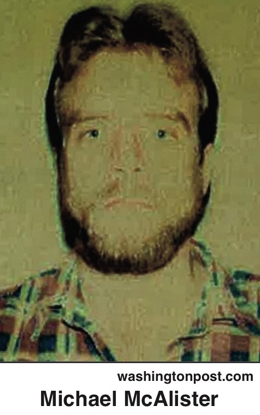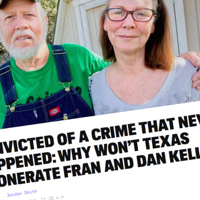Rascals case in brief
In the beginning, in 1989, more than 90 children at the Little Rascals Day Care Center in Edenton, North Carolina, accused a total of 20 adults with 429 instances of sexual abuse over a three-year period. It may have all begun with one parent’s complaint about punishment given her child.
Among the alleged perpetrators: the sheriff and mayor. But prosecutors would charge only Robin Byrum, Darlene Harris, Elizabeth “Betsy” Kelly, Robert “Bob” Kelly, Willard Scott Privott, Shelley Stone and Dawn Wilson – the Edenton 7.
Along with sodomy and beatings, allegations included a baby killed with a handgun, a child being hung upside down from a tree and being set on fire and countless other fantastic incidents involving spaceships, hot air balloons, pirate ships and trained sharks.
By the time prosecutors dropped the last charges in 1997, Little Rascals had become North Carolina’s longest and most costly criminal trial. Prosecutors kept defendants jailed in hopes at least one would turn against their supposed co-conspirators. Remarkably, none did. Another shameful record: Five defendants had to wait longer to face their accusers in court than anyone else in North Carolina history.
Between 1991 and 1997, Ofra Bikel produced three extraordinary episodes on the Little Rascals case for the PBS series “Frontline.” Although “Innocence Lost” did not deter prosecutors, it exposed their tactics and fostered nationwide skepticism and dismay.
With each passing year, the absurdity of the Little Rascals charges has become more obvious. But no admission of error has ever come from prosecutors, police, interviewers or parents. This site is devoted to the issues raised by this case.
On Facebook
Click for earlier Facebook posts archived on this site
Click to go to
Today’s random selection from the Little Rascals Day Care archives….
Click for earlier Facebook posts archived on this site
Click to go to
Today’s random selection from the Little Rascals Day Care archives….
‘Parent-experts’ found meaning where there was none
 April 6, 2012
April 6, 2012
“Parent-experts made a specific kind of sense of their children’s behaviors and emotions by retrospectively interpreting them as sequelae of day care ritual abuse rather than as reactions to familial stress, the vicissitudes of growing up or, for that matter, the stress of the investigation and the interrogations. ….
“Parent-experts testified that they never had reason to worry about their children’s behavior until they disclosed ritual abuse. Then, to the parent-experts, the tantrums, fears and sleep disturbances that once had looked like nothing more than normal growing pains were retrospectively interpreted….”
– From “The Day Care Ritual Abuse Moral Panic” by Mary De Young (2004)
Judge Marsh McLelland’s allowing parents to testify as experts about their children’s behavior was one of the key defects pointed out by the N.C. Court of Appeals in overturning the convictions of Bob Kelly and Dawn Wilson.
Lack of DNA evidence opens way for injustice
 April 18, 2015
April 18, 2015
“DNA testing has been used 329 times now to prove the innocence of people wrongly convicted of a crime. But what happens when there is no DNA evidence to prove someone’s innocence? What happens when there is only his word, and the mounded doubts of the team that prosecuted and convicted him? And what happens when – despite growing certainty that it has imprisoned the wrong man for more than 20 years – the Commonwealth of Virginia stands poised to keep him locked up, possibly forever?
“Of all the maddening stories of wrongful convictions, Michael McAlister’s may be one of the worst. For starters, he has been in prison for 29 years for an attempted rape he almost certainly did not commit….”
– From “This Man Deserves a Pardon” by Dahlia Lithwick at Slate (April 13)
Michael McAlister’s story surely qualifies as “one of the worst,” but forgive me if I think Junior Chandler – coincidentally now serving his 29th year of imprisonment – has suffered every bit as much injustice. And in McAlister’s case at least a crime was actually committed, just not by him.
Less bonding, less crying, more thinking – why not?
Jan. 21, 2013
“According to advocates (of victim impact statements), they allow victims to personalize the crime and elevate the status of the victim by describing the effect the crime has had on them or their families. Some laud the courtroom ritual as an aid in the emotional recovery of the victim…. A few legal scholars suggest that the well-intentioned personalization of a crime can blur the line between public justice and private retribution….”
– From “Death by Treacle” by Pamela Haag in the American Scholar (Spring 2012)
“Prosecutor Nancy Lamb and the mothers of the victims burst into tears. Court officials handed out tissues.”
– From “Day Care Owner Convicted on 99 Counts of Child Abuse” by the Associated Press (April 22, 1992)
Count me with those “few legal scholars” who doubt justice is well served by injections of sentimentality. (Although Bob Kelly’s sentencing seems to have concluded without victim impact statements, prosecutors ensured an ample display of mawkishness – the front row was packed with supposed child-victims holding tight to their dolls and teddy bears.)
But sentimentality also extends to the blindered bonding of Little Rascals prosecutors and parents.
What if Nancy Lamb had managed to keep even the slightest professional distance between herself and the parents, instead of being swallowed up in their manic cause? Might she have been able to glimpse reality?
And what if Bill Hart had avoided dating (and later marrying) one of those parents?
Pennsylvania prosecutor Alan Rubenstein managed to avoid such pitfalls – why couldn’t others?
‘There are no profiles in courage out there’

theintercept.com
The Intercept article
April 25, 2016
“Prosecutors wield extraordinary, unparalleled, and unchecked power. ‘They alone decide who to prosecute for criminal offenses, what charges to bring against them, and what punishments to seek,’ as the National Registry (of Wrongful Convictions) says. ‘In practice, that power extends to convicted defendants as well. If a sitting prosecutor asks the appropriate court to vacate the judgment and dismiss the charges against a defendant … it will happen.’
“But this requires political will. And too often, the will is not there. As (Keith Hampton, attorney for Fran and Dan Keller) notes, convincing a prosecutor that an injustice has happened can be a tough pull: ‘Unless you have DNA – unless you get the DA completely cornered – there are no profiles in courage out there,’ he says.
“Still, the number of exonerations in cases where no crime was actually committed are on the rise – so at least in some jurisdictions, individuals aren’t forever left in the kind of limbo in which the Kellers find themselves. The National Registry includes 540 exonerations in no-crime cases, including 51 exonerations in child sex abuse ‘hysteria’ cases (including Bob Kelly and Dawn Wilson)….”
– From “Convicted of a Crime That Never Happened: Why Won’t Texas Exonerate Fran and Dan Keller?” by Jordan Smith at the Intercept (April 8)
![]()











0 CommentsComment on Facebook